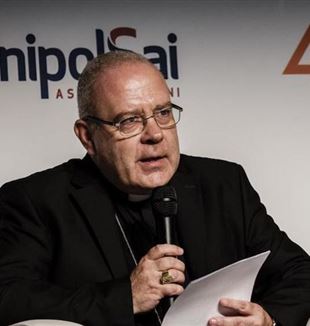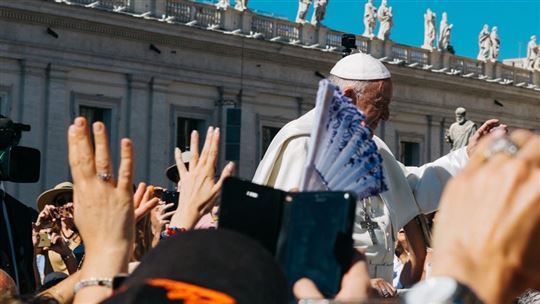
Chile: The "dream of fraternity" and the task of friendship
The presentation of the encyclical "Fratelli tutti" for the Chilean community, a dialogue with Nuncio Alberto Ortega Martín. An occasion, on Christmas Eve, to "remind ourselves of what we are called to do for the world."Meeting in the days leading up to Christmas to listen to Monsignor Alberto Ortega Martín, Apostolic Nuncio to Chile, was an opportunity to remember the essential: what is at the heart of our friendship and, within it, what we are called to do for the world.
The presentation of the Pope's Fratelli Tutti was an opportunity for the local community and many friends, in the words of Monsignor Ortega, to "listen to the Pontiff." For this reason, the Nuncio first of all let Francis speak, through the recovery of the main points of his Encyclical. Open and universal content, intended for "all people of good will," Ortega explained, specifying that, in each case, Christians can enter it with a particular depth, animated by faith. It is an invitation to a life "with the flavor of the Gospel," inspired by the words of St. Francis, with an intention free of dialectic that is centered upon the communication of God's Love. An attempt of dialogue, openness and contribution to reflection, which constitutes a "dream of fraternity that is not limited to words."
What then hinders this fraternity? It is important to recognize these factors, to help us be attentive, Ortega clarified, "Globalization connects us but does not unite us, leaving us more alone than ever. There is a loss of the sense of history. There is also the throwaway culture that makes us treat things and people in a disposable way. And then there is the temptation to build walls between us…."And yet, adverse contingencies such as a pandemic can be an opportunity to discover that we are not saved by ourselves, reawakening an awareness of our own limits, and the need for pain not to be useless. In this sense, adds the Nuncio, the Pope invites us to discover in circumstances, in others and in ourselves, opportunities to find the meaning of our existence. Thus, each of us is called to discover what the invitation of this Encyclical represents where we live, starting from our own country.
A first invitation, says Ortega, is certainly towards a "culture of encounter": "In the social scenario in which we live today, we are spurred towards a culture of recognizing the other, not as an enemy, but as a Good.” We must seek opportunities for dialogue with others, otherwise we will not be able to encounter, because by not wanting to discover a Good in others, in our family, social and political relationships, we miss out on the best. This search, when it is sincere, when it is for the good of all and does not only pursue self-interest, is a great opportunity to work together and move forward.
Another topic for reflection concerns "political love." The "bad reputation" of politics comes from seeing those who dishonor this vocation, forgetting the common good. "This vision is contrary to the one to which Pope Francis invites us, which is politics as an 'eminent form of charity,' where common paths are sought and an economy for the development of all is promoted." Political space can always be recovered and we are all called to this in different ways: through voting, but also in our conversations, seeking dialogue, and promoting vocations to politics in the service of good. That is, the Nuncio explained, we can dialogue with everyone when we keep the value of the person in mind and look for examples in which the life and dignity of all are respected.
Thinking of the Chilean Constitution, for example, we find in the Encyclical elements of a method for a new gaze towards the "common home" we inhabit, care for creation, ecological sensitivity, and aspects such as the invitation to encounter and reflect in all areas of society: "Everything I do has repercussions on others." We must always seek and recognize those "non-negotiable values" that place human life or the family at the center, without neglecting others, making sure that no one feels discriminated against.
"Considering the Pope's call, how can we contribute starting from our identity?" asked Solange Silva, who moderated the meeting. "By living faith and communion," Monsignor Ortega answered dryly, "It is necessary for communion not to be an accessory in Christian life, but the essence that makes us One." And our contribution is to "give flesh to these values," meaning that everyone has the opportunity to see these words embodied in us through our relationships and our way of life. "To be a place of promise of good for all" is a valuable contribution to proposing a humanity where these ideals are lived out, so that we can put ourselves at the service of others, "building bridges, facilitating dialogue, being available to build the good."